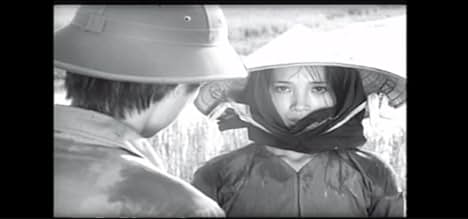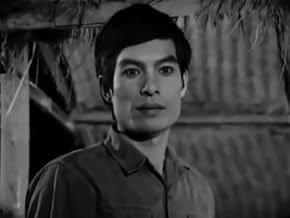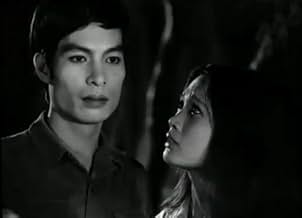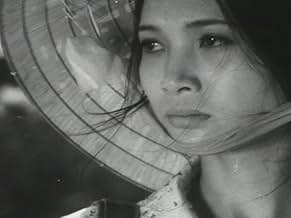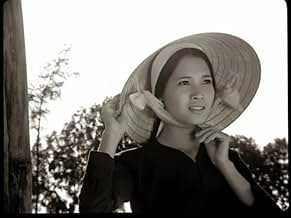IMDb-BEWERTUNG
7,6/10
572
IHRE BEWERTUNG
Füge eine Handlung in deiner Sprache hinzuDuyen faces a daily struggle to care for her young son and her weakened father-in-law, while keeping secret the fact that her husband died in a battle during the war.Duyen faces a daily struggle to care for her young son and her weakened father-in-law, while keeping secret the fact that her husband died in a battle during the war.Duyen faces a daily struggle to care for her young son and her weakened father-in-law, while keeping secret the fact that her husband died in a battle during the war.
- Auszeichnungen
- 1 Gewinn & 2 Nominierungen insgesamt
Empfohlene Bewertungen
"But why are you still alive?"
This is a war film, but it's one about the human cost to those waiting at home while loved ones go off to fight, not actual combat. In it, a young woman (Le Van) harbors a secret from her family - she knows that her husband was killed about a year ago. She keeps up the ruse by having a man she's met on a ferry write letters as if he were him, but eventually the two begin having feelings for one another. There is a fair dose of melodrama in the story set to soaring, emotional music, and it's effective at making one feel the national sorrow for millions over decades of brutal fighting. In the quote above, uttered by the innocent boy to a comrade of his dead father's, followed by the man's look of wild grief, the film also captures a sense of survivor's guilt in a deeply moving way.
Le Van is brilliant at conveying the angst of her situation and the profound isolation of keeping her secret. She's also wonderful in performing the cheo (a traditional Vietnamese theatrical opera) in the middle of the film, one which mirrored her character's life. In an earlier scene there is mention of the government selecting their village as one that will be involved with the "adoption movement for martyr families," meaning that if they've lost a son in war, another young man will "become their son" as a pragmatic replacement, a parallel to her possibly replacing her husband. Similarly, when her husband's comrade in arms appears at his father's deathbed and gives the old man comfort by pretending to be his son, we get the feeling of a desperate salve to lives lost, and people carrying on as best they can.
Throughout the film there is beautiful cinematography, completely in tune with the emotions of the people in this little village. The long shot of the new man trudging through a rice field, the young woman flying a kite he's made for her son on a hillside, and him taking the ferry across the river when the town begins to suspect a scandal are all fantastic. I also loved the bits of magical realism, like the meeting with the village god, or the market held near a temple held on (lunar) July 15, the traditional day of Tet Trung Nguyen (Ghost Festival), in the middle of the "ghost month," arranged so that living and dead can meet each other.
The film has its focus on those who suffered behind the scenes because of the war, not revolutionary propaganda as in other films, but unfortunately it can't help itself at the very end, when we see flags proudly flying, and the little boy going off to school. Maybe it was necessary as an uplift, an indication that life must go on for the people and the country after countless tragedies, but it felt a little off. Unfortunately, director Dang Nhat Minh had to run the gauntlet with the censors 13 times with this film, who were sensitive to love blossoming with the teacher and to the ghost sequence, and one wonders what this film would have looked like unfettered. Still, very well made, and packs a punch.
This is a war film, but it's one about the human cost to those waiting at home while loved ones go off to fight, not actual combat. In it, a young woman (Le Van) harbors a secret from her family - she knows that her husband was killed about a year ago. She keeps up the ruse by having a man she's met on a ferry write letters as if he were him, but eventually the two begin having feelings for one another. There is a fair dose of melodrama in the story set to soaring, emotional music, and it's effective at making one feel the national sorrow for millions over decades of brutal fighting. In the quote above, uttered by the innocent boy to a comrade of his dead father's, followed by the man's look of wild grief, the film also captures a sense of survivor's guilt in a deeply moving way.
Le Van is brilliant at conveying the angst of her situation and the profound isolation of keeping her secret. She's also wonderful in performing the cheo (a traditional Vietnamese theatrical opera) in the middle of the film, one which mirrored her character's life. In an earlier scene there is mention of the government selecting their village as one that will be involved with the "adoption movement for martyr families," meaning that if they've lost a son in war, another young man will "become their son" as a pragmatic replacement, a parallel to her possibly replacing her husband. Similarly, when her husband's comrade in arms appears at his father's deathbed and gives the old man comfort by pretending to be his son, we get the feeling of a desperate salve to lives lost, and people carrying on as best they can.
Throughout the film there is beautiful cinematography, completely in tune with the emotions of the people in this little village. The long shot of the new man trudging through a rice field, the young woman flying a kite he's made for her son on a hillside, and him taking the ferry across the river when the town begins to suspect a scandal are all fantastic. I also loved the bits of magical realism, like the meeting with the village god, or the market held near a temple held on (lunar) July 15, the traditional day of Tet Trung Nguyen (Ghost Festival), in the middle of the "ghost month," arranged so that living and dead can meet each other.
The film has its focus on those who suffered behind the scenes because of the war, not revolutionary propaganda as in other films, but unfortunately it can't help itself at the very end, when we see flags proudly flying, and the little boy going off to school. Maybe it was necessary as an uplift, an indication that life must go on for the people and the country after countless tragedies, but it felt a little off. Unfortunately, director Dang Nhat Minh had to run the gauntlet with the censors 13 times with this film, who were sensitive to love blossoming with the teacher and to the ghost sequence, and one wonders what this film would have looked like unfettered. Still, very well made, and packs a punch.
Beautifully shot, although I wish the copy on YT was in better quality, good plot, stunning lead actress, generally good performances. Duyen's plight feels real, her decision makes sense to her from what we see, Khang's predicament is believable and his decision realistic and heartfelt, and even Duyen's deceased husband is very genuine in the scenes he appears. Her little boy is also very natural.
However it suffers from a few scenes that overdramatize emotions, because they are glaring in the context of everything else that feels very authentic and even subtle.
I liked the singing part and I was surprised that Duyen could sing that well all of a sudden. That song was very emotionally charged and Khang watching her sing was a well thought-out scene. Also, the scenes at the ghost temple are very interesting, and I understand the censorship didn't like them very much so a lot had to be cut out. What remains is still interesting though. Communist China also censors stories about ghosts I think, I don't understand what they believe the danger is there.
Anyway, I believe the movie could have been much better without the excessive melodrama of a few scenes so I just couldn't rate it higher, but it is a powerful story told well so I understand the historical and cultural relevance of the movie, I just cannot love it as much as others do. The cinematography is beautiful and if it could have been restored the movie would look absolutely gorgeous.
However it suffers from a few scenes that overdramatize emotions, because they are glaring in the context of everything else that feels very authentic and even subtle.
I liked the singing part and I was surprised that Duyen could sing that well all of a sudden. That song was very emotionally charged and Khang watching her sing was a well thought-out scene. Also, the scenes at the ghost temple are very interesting, and I understand the censorship didn't like them very much so a lot had to be cut out. What remains is still interesting though. Communist China also censors stories about ghosts I think, I don't understand what they believe the danger is there.
Anyway, I believe the movie could have been much better without the excessive melodrama of a few scenes so I just couldn't rate it higher, but it is a powerful story told well so I understand the historical and cultural relevance of the movie, I just cannot love it as much as others do. The cinematography is beautiful and if it could have been restored the movie would look absolutely gorgeous.
The legacy of the Vietnam war is described vividly from the real sufferers, not from Hollywood. The theme of this movie is somehow similar to the famous movies " Cranes are Flying" and " Ballad of Soldier" from the former Soviet Unions. Highly recommended.
10jtran-1
All human emotions are reflected in this movie with great subtlety and within the context of the Viet Nam war tragedy. The plot and subplot are seamlessly weave into one another. All the roles are portrayed superbly. Ms Le Van as Duyen (Zuyen) has one of the most beautiful face in cinema. Above all she is a great actress. The cinematography is art work, showing the landscape of an ordinary vietnamese village in a lovely and poetic way. My hat off to director Nhat Minh Dang. The film is a true masterpiece. Long live the villagers of Viet Nam.
"When the Tenth Month Comes" will probably appeal to a very small segment of the movie-watching public. Even foreign film buffs may find this movie simplistic and uninteresting. The strength of the movie lies in it's characterization of traditional pre-Communist values in Vietnam. The protagonist Zuyen who hides her husband's death from the rest of his family, provokes the question: who rightfully owns the memory of the fallen soldier. The film's answer is that it is the family, but not the state that has the right to the memory of the fallen soldier. Zuyen is wrong for hiding her husband's death from her father-in-law, but the rest of the society has no right to his memory, because they did not love him as she and his family did. The film is markedly pro-Confucian and anti-Communist. The English-subtitles for the movie were spotty at best. Non-Vietnamese may miss some of the dialogue, but the message of the movie comes across strongly. Recommended for die-hards and academics.
Top-Auswahl
Melde dich zum Bewerten an und greife auf die Watchlist für personalisierte Empfehlungen zu.
Details
- Erscheinungsdatum
- Herkunftsland
- Sprache
- Auch bekannt als
- The Love Doesn't Come Back
- Produktionsfirmen
- Weitere beteiligte Unternehmen bei IMDbPro anzeigen
- Laufzeit1 Stunde 25 Minuten
- Farbe
- Sound-Mix
Zu dieser Seite beitragen
Bearbeitung vorschlagen oder fehlenden Inhalt hinzufügen

Oberste Lücke
By what name was When the Tenth Month Comes (1984) officially released in India in English?
Antwort
